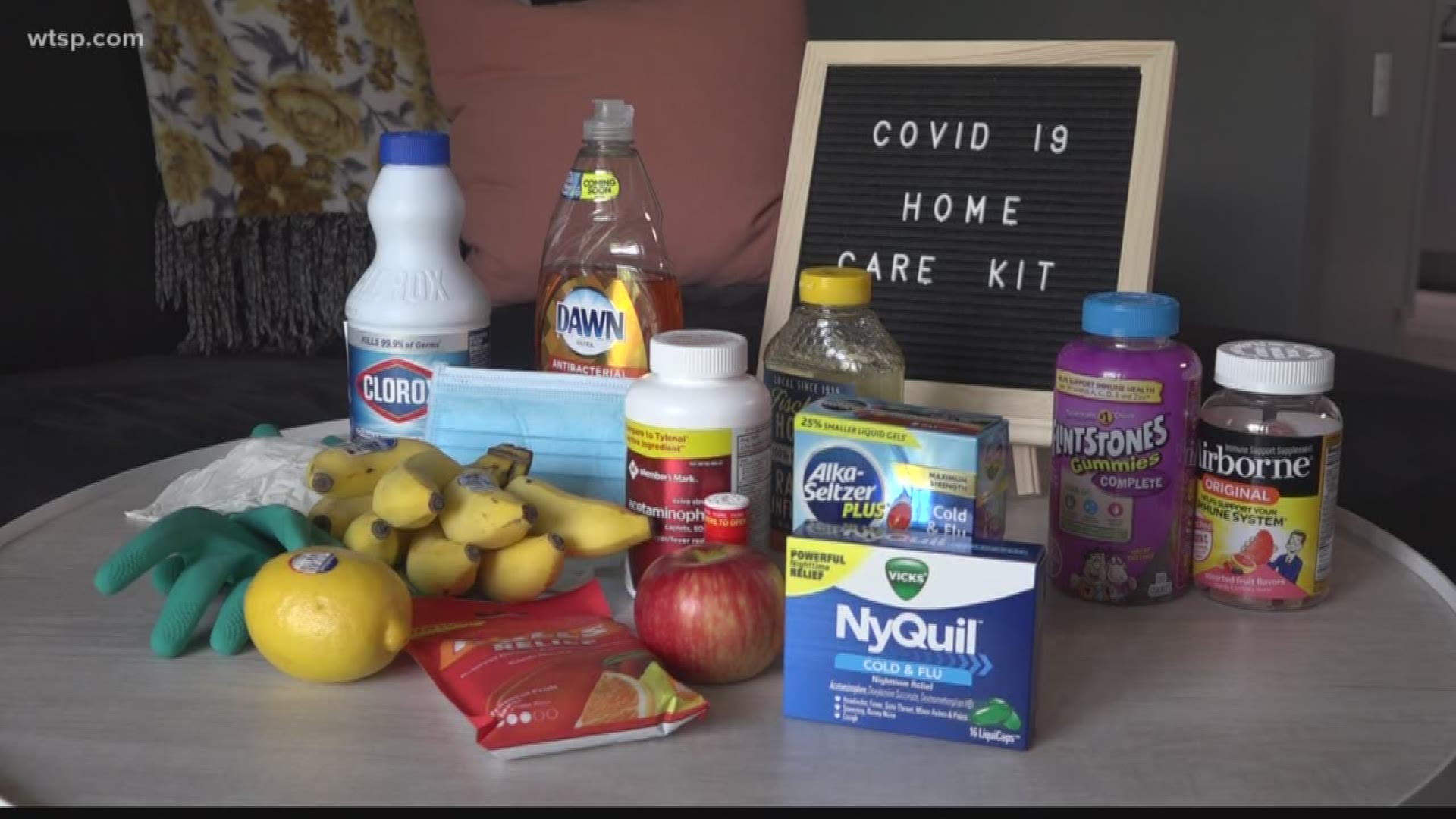TAMPA, Fla. — White House leaders said this week will be one of the toughest in dealing with COVID-19, but in Florida, health experts say our peak of deaths and infections is near the end of April.
"About 80 percent of all people infected with the coronavirus can be treated at home. Of those who don't about 10 percent will get better in a hospital and another five percent will have severe symptoms," said Dr. Nishant Anand, the Executive Vice President and Chief Medical Officer at BayCare.
So, what do you need to do when someone in your home is sick with COVID-19?
Here are some tips and supplies you'll need:
The best-case scenario is giving the sick person their own room. No one else should enter that room, even pets. If possible, give them their own bathroom to use as well. If that isn't possible, make sure the person is wearing a mask when they leave the bedroom and disinfect the bathroom before anyone else uses it.
"The person who is sick should get their own set of towels, bed linens and dishes," said Dr. Anand. This will reduce the risk of spreading the virus to someone else in the home. Their laundry and dishes should be done separately from others and with the warmest water possible.
It's a good idea to make sure you have an "at-home care kit" put together, just in case. You'll need safety and cleaning supplies, different medicine and healthy food and drinks.
What kinds of supplies do I need?
Make sure you have disinfectants, like Clorox, Lysol or bleach. The CDC has a recommended list of disinfectants and how they should be used in your home. You'll want plastic gloves, either dish gloves or plastic disposable gloves will work. You'll wear those when handling dirty laundry or dishes and when using disinfectants. Make sure you have soap and laundry detergent.
Face masks are also recommended, either medical grade or something handmade.
"When you're infected, you should wear a mask around your loved ones as much as possible. If you can't, they should wear one to protect themselves," said Dr. Anand.
What kind of medications should I have?
"With COVID-19, you treat the symptoms they may have. So if they have a fever, they can take Tylenol. If they have a cough, you can take cough medicine, any over the counter medications," said Dr. Anand.
You'll want cough syrup, cough drops, Tylenol or acetaminophen and a thermometer to monitor fever. Consider adding a multivitamin or vitamin C supplement to the daily dosage of medication.
What kinds of things should a sick person be eating or drinking?
"I always joke and say I love chicken noodle soup, so that's actually something you can't go wrong with. Eat and drink so you stay hydrated. The worst thing you can do is stop eating and lose a bunch of weight so your body gets even weaker," said Dr. Anand. You'll want lots of liquids. Think water, tea, juice and electrolyte replacement drinks but be conscious of sugar. Healthy fruits, like fresh apples, oranges, bananas and lemons are good to have. Honey in hot water or tea and warm soup can help as decongestants and provide some nourishment,
Make sure to include enough lean, healthy proteins as well.
When is the right time to seek professional medical attention?
Look for these four symptoms as a sign to go to the hospital:
- Shortness of breath
- Chest pains
- Confusion and lethargy
- Blue lips.
How long is a person sick with COVID-19?
Symptoms can last anywhere from four to 14 days.
When do I know if someone is better?
"When you're fever-free for about three days or 72 hours. That means a continuous 72 hours with no fever and your shortness of breath and cough are better," said Dr. Anand. He suggests still taking precautions to keep others from getting sick though. Avoid contact with elderly or more at-risk people and wear a mask around your family members for a few days before fully re-integrating back into your regular home life.
For more information about COVID-19, you can access the CDC's information here.
- Hundreds of American, Southwest airlines employees test positive for COVID-19
- NYC virus deaths exceed 3,200, topping the number of people who died on 9/11
- Coronavirus forecast: April 21 projected as Florida's peak
- COVID-19 in your neighborhood: You can track Florida coronavirus cases by zip code
- When will your federal stimulus check arrive?
- Hotlines, websites offer the latest on COVID-19
FREE 10NEWS APP:
►Stay In the Know! Sign up now for the Brightside Blend Newsletter



